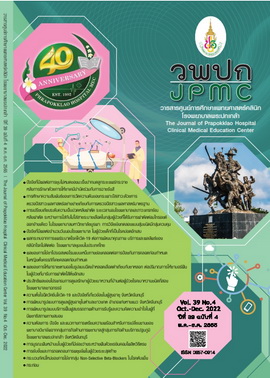The Model Development of Perceptual & Cognitive Rehabilitation Service for People with Brain Pathology
Main Article Content
Abstract
BACKGROUND: Impairment of perceptual and cognitive functions impacts a person's ability to perform daily life occupations. Several limitations of the service system, some patients lack the opportunity to receive appropriate perceptual & cognitive rehabilitation.
OBJECTIVES: To develop a perceptual & cognitive rehabilitation service model for people with brain pathology.
METHODS: This research study is based on qualitative research methodology using lessons learned from developing a model of perceptual and cognitive rehabilitation services.
RESULTS: This study is based on an analysis of a model development of perceptual and cognitive rehabilitation services. A perceptual and cognitive rehabilitation clinic was established in the occupational therapy department. This developing model process consisted of finding the problem, gathering relevant knowledge from literature reviews, evidence-based practice, observational study & training and advice from expert’s professional; following process are design, establish and review the opportunity to continuously improve the service system. This model development effect on service process, all patients in the rehabilitation program in the occupational therapy department will be received perceptual & cognitive function assessing and training. After receiving the perceptual & cognitive rehabilitation, 97.5% of all patients have progression. The most progression is attention, memory and orientation. The result of this model shows the knowledge transfers to healthcare professionals in external organizations.
CONCLUSIONS: This model development has value for patients in the service process. There were knowledge transfers and learning resources for the healthcare professional. This knowledge is a guideline for designing and creating service systems according to the context of each organization. However, developing a local and regional professional network for knowledge sharing would also contribute to the maturation of the model.
Article Details

This work is licensed under a Creative Commons Attribution-NonCommercial-NoDerivatives 4.0 International License.
References
Ministry of Public Health, Department of Health Service Support. Professional Standards for The Art of Healing in Occupational Therapy. Bangkok : Bureau of Sanatorium and Art of Healing; 2011.
Occupational therapy practice framework: domain and process 3rd edition. Am J Occup Ther. 2014;68Suppl 1:S1-48.
Cicerone KD,Goldin Y,Ganci K,Rosenbaum A, Wethe JV, Langenbahn DM, et al. Evidence-based cognitive rehabilitation: a systematic review of the literature from 2009 through 2014. Arch Phys Med Rehabil 2019;100:1515-33.
Irazoki E,Contreras-Somoza LM,Toribio-Guzmán JM,Jenaro-Río C, van der Roest H, Franco-Martín MA. Technologies for cognitive training and cognitive rehabilitation for people with mild cognitive impairment and dementia. a systematic review. Front Psychol [Internet] 2020 [cited 2022 June 5]; 11:648. Available from: https://www.ncbi.nlm.nih.gov/pmc/articles/PMC7179695/pdf/fpsyg-11-00648.pdf
Khanthee R, Dhippayom JP, Munkhetvit P. Effects of cognitive training program on cognitive abilities in stroke patients. Bull Chiang Mai Assoc Med Sci 2016;49:298-306.
Chaiwong P, Rattakorn P, Munkhetvit P. Effects of cognitive training program on cognitive abilities and quality of life in elderly with suspected dementia. Bull Chiang Mai Assoc Med Sci 2015;48:182–91.
Munkatevit P, Rattakorn P, Boonchatkul, Apikomolkorn H, Chaiwong P, Panyanon T. A manual of cognitive training program for the elderly with mild cognitive impairment. In: Faculty of Associated Medical Sciences. Assessment and rehabilitation of cognitive therapy in people with MCI and dementia. Workshop of the Department of Occupational Therapy 2018; 2018 Dec 18-21; Chiang Mai, Thailand. Chiang Mai: Faculty of Associated Medical Sciences Chiang Mai University; 2018.
TantirittisakT. Clinical Practice Guidelines : Dementia. Bangkok: Neurological Institute of Thailand; 2014.
Pratoomtan D. Effects of cognitive and perceptual training in stroke patient. In: Sum-Im T, editors. Conference proceeding of The 13 Srinakharinwirot University Research Conference; 2020 Mar 25-26; Bangkok, Thailand.Bangkok; Strategic Wisdom and Research Institute, Srinakharinwirot University; 2020.P.229-38.
Zucchella C,Capone A,Codella V,Vecchione C,Buccino G,Sandrini G, et al. Assessing and restoring cognitive functions early after stroke. FunctNeurol 2014;29:255-62.
Pratoomtan D, Rattakorn P, Munkhetvit P. Effect of home-based cognitive training kit and satisfaction of elderly with mild cognitive impairment. The Journal of Occupational Therapist Association of Thailand 2013;18(3):35-46.
Ministry of public health, Department of Medical Services. Guidelines for providing occupational therapy services in road accident victims.Nonthaburi: Sirindhorn National Center for Medical Rehabilitation; 2012.
Thaivon T, Munkhetvit P. Effects of applications on computer tablet for cognitive training in stroke patients. ASEAN J Rehabil Med. 2020;30:47-53.
Lauenroth A, Ioannidis AE, Teichmann B. Influence of combined physical and cognitive training on cognition: a systematic review. BMC Geriatr [Internet]. 2016[cited 2022 June 5];16:141.Available from: https://www.ncbi.nlm.nih.gov/pmc/articles/PMC4950255/pdf/12877_2016_Article_315.pdf
Griffiths J, Thaikruea L, Wongpakaran N, Munkhetvit P, Kittisares A, Varnado P. Effects of combined physical movement activity and multifaceted cognitive training in older people with mild neurocognitive disorder in a rural community: a randomized controltrial. Dement Geriatr Cogn Disord 2020;49:194-201.

